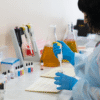Are you experiencing symptoms such as dry skin, irregular menstruation, hair loss, mood swings, exhaustion, and cold intolerance? You don’t need to be worried; get your car out of the parking lot and visit your medical practitioner. Inform him of the entire situation; he may find some symptoms of a thyroid condition and may ask you for a thyroid function test. These tests aim to identify diseases such as Graves’ disease, Hashimoto’s disease, hypo- or hyperthyroidism, and thyroid cancer.
Thyroid test types include imaging, nuclear medicine, and blood testing. Many variables, including hypertension, inflammation, thyroid nodules, etc., are some of the common causes of thyroid function disorders. Moreover, we will go into great detail about thyroid function testing in this blog, including its goals, methods, and preparation. We also respond to your inquiries when the final verdict is given!
Understanding Thyroid Function
Despite its small size, the thyroid, the tiny butterfly gland in your neck, is a powerful organ! It produces hormones such as T3 and T4, which function as microscopic messengers, instructing your body to consume energy, control body temperature, and maintain optimal brain activity.
It is considerably remarkable, considering its tiny size. The pituitary gland functions as a conductor to control this butterfly by directing the thyroid’s production of hormones through the production of TSH, a unique signal. Your body maintains moving smoothly even if the dance is intricate!
Purpose of Thyroid Tests
Thus, a thyroid test may be thought of as an engine check for your body. It assists your physician in determining if the small powerhouse in your neck, the thyroid gland, is functioning properly. You see, the thyroid regulates several functions, including mood, energy levels, and metabolism.
It is therefore possible to determine whether your thyroid is the cause of persistent fatigue, weight gain, loss without conscious effort, or general lack of self-awareness by a thyroid test. It’s similar to performing a check-up on your body to make sure everything is functioning properly!
Common Thyroid Tests
There are 3 thyroid function tests that usually take place in the different laboratories.
Thyroid-Stimulating Hormone (TSH) Test
The TSH test indicates whether everything functions appropriately by acting as a whisper between your brain and thyroid. High levels indicate a slow-moving thyroid (little gas! ), while low levels indicate an overactive thyroid (get on the gas!). Through early thyroid problem diagnosis made possible by this test, doctors can help you get back on track to feeling your best!
Thyroid Hormone (T3 and T4) Tests
Tests for T3 and T4 directly examine thyroid hormone levels. Increased levels of T4 and T3 may suggest hyperthyroidism, whereas low levels may indicate hypothyroidism. In addition to TSH testing, these tests offer insightful information on thyroid function and aid in the diagnosis of thyroid diseases.
Thyroid Antibody Tests
Thyroid antibody tests uncover immune system attacks on the thyroid. Elevated levels suggest Graves’ disease or Hashimoto’s thyroiditis. Waiting for results can be tense, but clarity brings relief. These tests confirm diagnoses, guide treatment choices, and offer a beacon of hope amid uncertainty.
Procedure of Thyroid Testing
Thyroid hormone (TSH, T3, and T4) levels are frequently measured by blood testing. Usually, your doctor will draw a little blood sample from your arm. Fasting before an exam is sometimes necessary to ensure precise findings. The turnaround time for results is typically a few days. Your doctor will interpret the results based on typical ranges or your symptoms.
They may sometimes employ imaging procedures such as radioactive iodine scans or ultrasounds to get further data. By determining if you have thyroid issues such as hyperthyroidism or hypothyroidism, these tests help you receive the proper care.
Preparation for Thyroid Tests
Thyroid test preparation involves following particular instructions from your physician. This might entail abstaining from specific drugs, including thyroid hormones or iodine supplements, for a certain amount of time before the test and temporarily stopping them. It is crucial to have a healthy lifestyle in the days before the test since lifestyle variables like stress levels and sleep habits can also affect thyroid function.
Interpreting Thyroid Test Results
It’s essential to know the typical ranges for thyroid hormones and TSH levels to interpret the findings of thyroid tests. Healthcare practitioners use established recommendations to analyze data, even though reference ranges may differ significantly between laboratories.
The findings of an abnormal thyroid test point to an underlying thyroid condition that needs to be further investigated and treated. To appropriately interpret test findings and create a management plan customized to your specific requirements, you must talk with a healthcare expert.
Conclusion
The thyroid function test is an essential tool for determining thyroid function and identifying thyroid conditions. You may actively manage your thyroid health by knowing the goal, process, and preparation for thyroid testing. If you have any questions or concerns about the health of your thyroid, don’t hesitate to ask your healthcare practitioner. Also, remember to heed their suggestions for thyroid tests. Your proactive attitude to thyroid health can result in optimal health, early identification, and efficient treatment.
Can a person get a thyroid test at home?
There are thyroid function tests that can be completed at home, such as taking a basal body temperature or utilizing at-home kits; the findings from these techniques might need to be more thorough and precise than those from tests carried out in a professional laboratory.
Is the thyroid function test screening or diagnostic?
Tests for thyroid function are used for both screening and diagnosis tests. They help in early diagnosis because, as screening tests, they identify possible thyroid abnormalities in people with no symptoms. In contrast, symptomatic individuals serve as diagnostic instruments that validate or exclude particular thyroid illnesses.
How long does it take for a blood test to get results?
The turnaround time for results varies according to the lab and kind of test, but it usually takes a few days.
What happens if the results of my thyroid test are not expected?
If more testing or treatment is necessary, your doctor will go over the results with you, explain what they indicate, and make recommendations.










